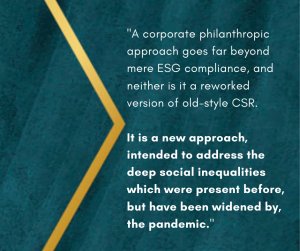Seven in ten US corporate funders surveyed by the Charities Aid Foundation of America had increased their charitable contributions in 2020. We have also seen revolutionary approaches to giving from major foundations who are issuing social bonds for the first time to fast-track their response to the pandemic crisis. A McKinsey report notes that it is ‘not only the scale of capital being committed by major philanthropists (at least $10.3 billion globally in May 2020, according to Candid, which is tracking major grants) but also how it is being given: at record speed, with fewer conditions, and in greater collaboration with others.’
 For those corporates which have the capacity, as Larry Fink, CEO of BlackRock observes, ‘to prosper over time, every company must not only deliver financial performance, but also show how it makes a positive contribution to society.’ This is the moment for corporates to consider their purpose – and we believe it is constructive for corporates to re-examine and deepen their engagement with the health of the society on which they depend with a philanthropic mindset.
For those corporates which have the capacity, as Larry Fink, CEO of BlackRock observes, ‘to prosper over time, every company must not only deliver financial performance, but also show how it makes a positive contribution to society.’ This is the moment for corporates to consider their purpose – and we believe it is constructive for corporates to re-examine and deepen their engagement with the health of the society on which they depend with a philanthropic mindset.
We believe that approaching social problems through a philanthropic lens can be a useful way for corporates to ensure their intentions and resources are well directed, allowing them to explore how they might do things in a new way, and at a scale they haven’t before, and in a way that responds directly to the increased pressures on society brought about by the pandemic.
Corporate philanthropy is wider than ESG compliance
A corporate philanthropic approach goes far beyond mere ESG compliance, and neither is it a reworked version of old-style CSR. It is a new approach, intended to address the deep social inequalities which were present before, but have been widened by, the pandemic.
Thinking in a ‘philanthropic’ way has advantages:
- The philanthropic sector has an established track record of innovative and effective interventions in the systemic problems of society, which can provide useful parallels for the corporate sector when decisions are being made about social engagement strategy and resources.
- Thinking ‘philanthropically’ enables a more strategic and long-term engagement with underlying societal problems than thinking ‘charitably’ (which tends to be the act of giving for immediate relief).
- It allows the corporate, through its Board, the freedom to express itself according to its conscience and its values beyond ESG and CSR mandates.
Corporate philanthropy has business and competitive value
Iain Rawlinson explains, ‘The potential for philanthropy to become part of the DNA of the business is significant – where the applicable currencies are much wider than financial contribution – it’s about shaping a strategic approach to the deployment of money, time, information, skills and people to achieve outcomes – which are the core competencies of the corporate world. Why should these not be applied to building capacity, shaping the context and building solutions around social issues? In this way building economic value truly serves society, rather than the other way round, which tends to be the present outcome.’
‘This is the moment for Boards to develop corporate philanthropy into a core element of business strategy,’ adds Ben Morton Wright. ‘Corporate philanthropy offers the opportunity for a broader and more meaningful value for a wider group of stakeholders, whilst still meeting the needs of shareholders. The pandemic has catalysed a paradigm shift for corporate engagement with society – and corporates now need to commit even further and more deeply to engage with stakeholders and communities across a wide range of societal issues.’
We believe there is a bond to be made between the corporate’s ability to organise and deliver on target outcomes, and the historic expertise and track record of the philanthropic sector in engaging with systemic social problems. Understood in these terms, corporate philanthropy broadens the scope for active participation in, and creates diverse opportunities for, meaningful engagement with society.
We will be discussing the role of Corporate Philanthropy at Talking Philanthropy 2021. Register for your complimentary ticket here.
This article was first published on the Global Philanthropic blog on 13 January 2021. It is being reprinted in Alliance with permission.
Iain Rawlinson is Chair of Global Philanthropic and Co-Founder & Partner of Vico Partners, and Ben Morton Wright is Founder & Group CEO of Global Philanthropic.




Comments (0)